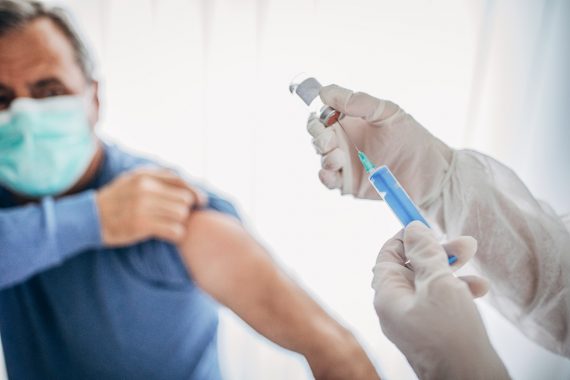Germany to offer mRNA Covid booster to all Astra Zeneca-jabbed patients

All German patients who were fully vaccinated with the Astra Zeneca Covid vaccine will be offered an mRNA booster from next month.
The decision, which was based on vaccine efficacy, also applies to people who received the single-dose Johnson & Johnson vaccine.
Federal health minister Jens Spahn said its booster programme comes amid growing concerns about ‘a reduced or rapidly declining immune response’ among some groups.
Germany is the first country in Europe to set out full details for boosters – which also includes vulnerable patients – and it confirmed all doses would be Pfizer or Moderna vaccines.
The UK booster programme is still in the planning stages but is expected to launch from September.
However, interim Joint Committee on Vaccination and Immunisation’s (JCVI) advice has made no mention of patients who received the Astra Zeneca vaccine – which would include the majority of people aged 40-50.
The AstraZeneca and Johnson & Johnson vaccines are both viral vector vaccines while the Pfizer and Moderna vaccines use novel mRNA technology.
The German Ministry of Health (BMG) said the decision was made after discussions with its scientific advisors.
A spokesperson said: ‘The BMG continuously monitors and evaluates the study situation of vaccinations against Covid-19.
‘The Conference of Health Ministers (GMK) has decided to offer all people whose first vaccination series consisted only of vector vaccines a booster vaccination with an mRNA vaccine in the interests of preventive health care.
‘People who have received a full vaccination with one of the two vector vaccines for the first vaccination protection should benefit from the higher protective effect of the heterologous vaccination scheme.’
Public Health England (PHE) has said all the vaccines used to date in the UK are highly effective against symptomatic Covid, with a Government-commissioned study revealing fully vaccinated people to be three times less likely to test positive.
The study, published this week, found that the Pfizer vaccine is 96% effective and the AstraZeneca vaccine is 92% effective against hospitalisation after both doses, including against the now-dominant Delta variant.
Asked whether the UK would also consider booster vaccines for everyone who had the somewhat-less-effective Astra Zeneca vaccine, the Department of Health and Social Care (DHSC) said the booster programme would be informed by the JCVI’s final advice.
Under the interim advice, the first stage of the programme will prioritise those ‘most at risk from serious disease’ – defined as care home residents, the over-70s, frontline health and social care workers, the clinically extremely vulnerable and the immunosuppressed.
The JCVI said these groups ‘should be offered a third dose Covid-19 booster vaccine and the annual influenza vaccine as soon as possible from September 2021’.
Stage two includes the over-50s, all those aged 16-49 in a flu or Covid ‘at-risk group’ and the adult household contacts of the immunosuppressed.
These groups ‘should be offered a third dose Covid-19 booster vaccine as soon as practicable after stage one, with equal emphasis on deployment of the influenza vaccine where eligible’.
A DHSC spokesperson said: ‘The Government is preparing for a booster programme and JCVI have published interim advice on who to prioritise for a possible third vaccine from September 2021.
‘The booster programme – which would ensure millions of people most vulnerable to Covid-19 will have the protection they have from first and second doses maintained ahead of the winter and against new variants – will be informed by the JCVI’s final advice.
‘We are working with the NHS as they draw up detailed plans to deliver this booster vaccination programme, alongside the annual flu vaccination programme, and more details about rollout will be set out in due course.’
At the same time, the German Government also announced it will begin offering vaccines to all children aged 12 and over.
GPs in the UK have recently been asked to vaccinate vulnerable children aged over 12, as well as those who live with an immunosupressed person, and all over-16s.
PHE estimates that the vaccination programme in England has prevented 22 million infections, around 52,600 hospitalisations and between 35,200 and 60,000 deaths to date.
Pulse October survey
Take our July 2025 survey to potentially win £1.000 worth of tokens

Visit Pulse Reference for details on 140 symptoms, including easily searchable symptoms and categories, offering you a free platform to check symptoms and receive potential diagnoses during consultations.
Related Articles
READERS' COMMENTS [1]
Please note, only GPs are permitted to add comments to articles










no thanx–had oaz times 2–felt ill for weeks
no more